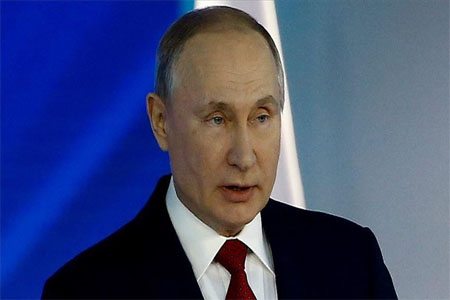
Afrasianet - Operation Preservation of Power for Kremlin chief Vladimir Putin has, as expected, cleared its final hurdle. A large majority of Russians voted for the new constitution. Photo: Alexei Druzhinin / Pool Sputnik Kremlin / AP / dpa
The controversial new Russian constitution was adopted with more than three quarters of the votes. With the "victory and vote of confidence", Kremlin chief Vladimir Putin can continue to govern - possibly until 2036. But there is also criticism.
Moscow (dpa) - Russian President Vladimir Putin writes "Pobeda" - victory - in large letters on a flat surface with peppy and content. The 67-year-old uses the cloudy, rainy day after the historic constitutional referendum in Moscow to thank his compatriots.
"I would like to say thank you very much for your support and trust," he said on Thursday at a meeting with the "Pobeda" committee, which is responsible for patriotic education in Russia. According to the electoral authorities, 77.9 percent of the voters voted for the new constitution, which will allow Putin to participate in further elections and rule until 2036. The Kremlin spoke of a “triumph” for the president.
21.27 percent of the voters voted “No”. Above all, the extra-parliamentary opposition around Putin's opponent Alexej Navalny, but also the communists and the liberal Yabloko party, protested against the new constitution. Some spoke of a constitutional overthrow, of “shame” and a funeral of the democratic constitution of 1993. According to this constitution, Putin would have had to resign in 2024.
The Kremlin chief also said he understood his opponents. "We have a lot of problems," said Putin. After 20 years in power, he once again offered himself as the number one problem solver. With the new Basic Law, a new era begins in Russia, in which the ex-head of the secret service can rule in the Kremlin for another 16 years - and with more powers than before. So its influence on the judiciary grows. In future he can appoint constitutional judges. According to experts, Putin's constitution is cementing a conservative orientation in the country, which is once again self-confident on the world stage.
As in the past, election officer Ella Pamfilova pushed aside criticism from independent election observers of the massive violations of the polls. The independent organization Golos spoke of “falsifications” of the results. In the North Caucasus, the regional princes Putin delivered results like at the height of the Soviet dictatorship with around 90 percent approval of the constitution.
The voter turnout was given nationwide at 67.97 percent - before that, there was initially talk of 65 percent. Accordingly, a total of 57.7 million people voted for the constitutional amendment. This corresponded to a share of 52.95 percent of the eligible voters. For the first time, people in the largest country in the world had seven days to cast their votes. The official reason was the Corona crisis, in which everyone should have enough time to organize their voting. But critics saw the goal of not forgetting anyone and making control impossible.
The new Basic Law promises numerous social benefits - such as an annual pension adjustment and a minimum wage. And according to experts, it represents Putin's anti-liberal course in recent years. Same-sex marriages, for example, are excluded by the new constitution. Above all, however, the constitution is likely to change political life in Russia. National law now takes precedence over international law.
For Russian citizens who complain against their state, the European Court of Human Rights in Strasbourg has so far been an important authority for justice. The raw material and nuclear power had repeatedly bothered by criminal judgments from international courts. National patriotic forces in particular called for an end to "patronizing" by other courts and for the sometimes high fines not to be paid.
The chairman of the Bundestag committee on human rights and humanitarian aid, Gyde Jensen, spoke of a “swan song for the last remnants of democracy” in Russia. The FDP politician criticized Russia for turning away from constructive work on the international stage. "At the level of the Council of Europe we must therefore also talk about withdrawing the voting rights of the Russian delegation," said Jensen. That happened once before after the Russian annexation of the Ukrainian Black Sea peninsula of Crimea.
Russia under Putin, however, repeatedly refuses to interfere in its internal affairs. The state advertising slogan “Our country, our constitution, our decision” also relied on sovereignty before the vote. For Putin, he said himself, the liberal policies of the West are at an end. For this reason, too, he had the constitution added that marriage was only possible between a man and a woman. There will be no same-sex marriage as long as he is in office, he stressed.
On Thursday, the Green Bundestag member Manuel Sarrazin spoke of a “constitutional spectacle for the eternal Putin”. The Kremlin advertises with Putin as guarantor of stability. "But stability means above all social and economic stagnation, conservative nationalism and undemocratic cemetery calm."

